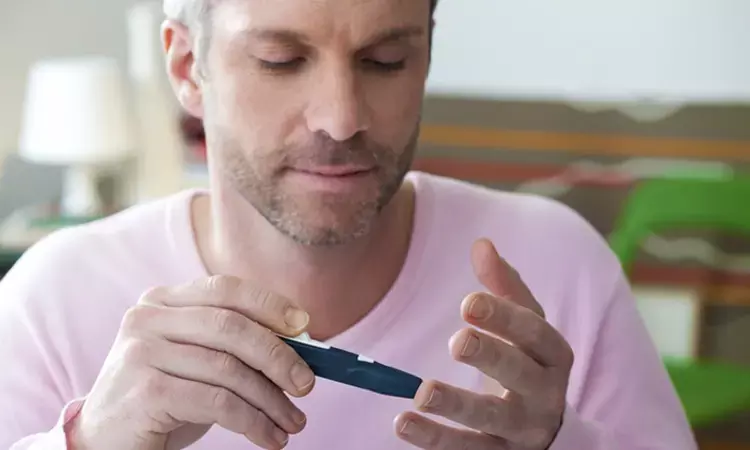- Home
- Medical news & Guidelines
- Anesthesiology
- Cardiology and CTVS
- Critical Care
- Dentistry
- Dermatology
- Diabetes and Endocrinology
- ENT
- Gastroenterology
- Medicine
- Nephrology
- Neurology
- Obstretics-Gynaecology
- Oncology
- Ophthalmology
- Orthopaedics
- Pediatrics-Neonatology
- Psychiatry
- Pulmonology
- Radiology
- Surgery
- Urology
- Laboratory Medicine
- Diet
- Nursing
- Paramedical
- Physiotherapy
- Health news
- Fact Check
- Bone Health Fact Check
- Brain Health Fact Check
- Cancer Related Fact Check
- Child Care Fact Check
- Dental and oral health fact check
- Diabetes and metabolic health fact check
- Diet and Nutrition Fact Check
- Eye and ENT Care Fact Check
- Fitness fact check
- Gut health fact check
- Heart health fact check
- Kidney health fact check
- Medical education fact check
- Men's health fact check
- Respiratory fact check
- Skin and hair care fact check
- Vaccine and Immunization fact check
- Women's health fact check
- AYUSH
- State News
- Andaman and Nicobar Islands
- Andhra Pradesh
- Arunachal Pradesh
- Assam
- Bihar
- Chandigarh
- Chattisgarh
- Dadra and Nagar Haveli
- Daman and Diu
- Delhi
- Goa
- Gujarat
- Haryana
- Himachal Pradesh
- Jammu & Kashmir
- Jharkhand
- Karnataka
- Kerala
- Ladakh
- Lakshadweep
- Madhya Pradesh
- Maharashtra
- Manipur
- Meghalaya
- Mizoram
- Nagaland
- Odisha
- Puducherry
- Punjab
- Rajasthan
- Sikkim
- Tamil Nadu
- Telangana
- Tripura
- Uttar Pradesh
- Uttrakhand
- West Bengal
- Medical Education
- Industry
Prolonged use of Dulaglutide reduces incidence of erectile dysfunction in men with T2DM: Study

Long-term use of Dulaglutide decreases the incidence of erectile dysfunction in type-2 diabetic male patients, suggests a study published in The Lancet: Diabetes and Endocrinology.
Diabetes is a major risk factor for erectile dysfunction, however, the effect of GLP-1 receptor agonists on erectile dysfunction are still not clear.
A study was conducted by Bajaj H et. al to evaluate the incidence, prevalence, and progression of erectile dysfunction in men treated with dulaglutide compared with placebo, and to determine whether dulaglutide's effect on erectile dysfunction was consistent with its effect on other diabetes-related outcomes.
The researchers conducted The Researching Cardiovascular Events with a Weekly Incretin in Diabetes (REWIND) trial which was a double-blind, placebo-controlled randomised trial of the effect of dulaglutide on cardiovascular outcomes. REWIND was done at 371 sites in 24 countries. Men and women aged older than 50 years with type 2 diabetes, who had either a previous cardiovascular event or cardiovascular risk factors were randomly assigned (1:1) to receive either dulaglutide or placebo. Participating men were offered the opportunity to complete the standardised International Index of Erectile Function (IIEF) questionnaire at baseline, 2 years, 5 years, and study end.
Between Aug 18, 2011, and Aug 14, 2013, 3725 (70·1%) of 5312 male participants with a mean age of 65·5 years (SD 6·4 years) were analysed, of whom 1487 (39·9%) had a history of cardiovascular disease and 2104 (56·5%) had moderate or severe erectile dysfunction at baseline.
The primary outcome for these analyses was the first occurrence of moderate or severe erectile dysfunction following randomisation, assessed by the erectile function subscores on IIEF.
Findings of the study are as follows:
- The incidence of erectile dysfunction following randomisation was 21·3 per 100 person-years in the dulaglutide group and 22·0 per 100 person-years in the placebo group.
- Men in the dulaglutide group also had a lesser fall in erectile function sub-score compared with the placebo group, with a least square mean difference of 0·61.
Thus, the researchers concluded that long-term use of dulaglutide might reduce the incidence of moderate or severe erectile dysfunction in men with type 2 diabetes.
Reference:
Erectile function in men with type 2 diabetes treated with dulaglutide: an exploratory analysis of the REWIND placebo-controlled randomised trial by Bajaj H et. al published in The Lancet: Diabetes and Endocrinology
DOI: https://doi.org/10.1016/S2213-8587(21)00115-7
Dr. Shravani Dali has completed her BDS from Pravara institute of medical sciences, loni. Following which she extensively worked in the healthcare sector for 2+ years. She has been actively involved in writing blogs in field of health and wellness. Currently she is pursuing her Masters of public health-health administration from Tata institute of social sciences. She can be contacted at editorial@medicaldialogues.in.
Dr Kamal Kant Kohli-MBBS, DTCD- a chest specialist with more than 30 years of practice and a flair for writing clinical articles, Dr Kamal Kant Kohli joined Medical Dialogues as a Chief Editor of Medical News. Besides writing articles, as an editor, he proofreads and verifies all the medical content published on Medical Dialogues including those coming from journals, studies,medical conferences,guidelines etc. Email: drkohli@medicaldialogues.in. Contact no. 011-43720751


